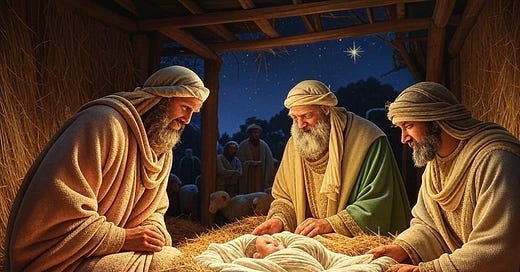The Three Wise Men: A Story of Faith, Mystery, and Enduring Symbolism
The story of the Three Wise Men, also known as the Magi, has captured the imagination of people for centuries. These enigmatic figures are central to the Nativity narrative, bringing gifts to the newborn Jesus and symbolizing the universal significance of His birth. Their journey, steeped in mystery and faith, continues to inspire and resonate during the Christmas season.
Who Were the Wise Men?
The Magi are mentioned in the Gospel of Matthew (2:1–12), but much about them remains shrouded in mystery. The Bible does not specify their names, number, or origins, though tradition has settled on three, likely due to the three gifts they bore: gold, frankincense, and myrrh. Over time, Christian tradition has named them Caspar, Melchior, and Balthazar, representing different parts of the known world—often interpreted as Europe, Asia, and Africa.
Historians and theologians suggest the Magi were likely scholars or astrologers from the East, possibly Persia or Babylon. Their title, “Magi,” connects them to a priestly caste skilled in interpreting dreams and studying the stars. Their expertise led them to notice an extraordinary celestial event—a star they believed heralded the birth of a king.
Following the Star
The journey of the Wise Men is one of profound faith. Guided by the Star of Bethlehem, they embarked on a long and arduous journey to find the newborn King. They likely traveled hundreds of miles across deserts and mountains, facing the harsh realities of ancient travel. Their unwavering determination reflects a deep spiritual conviction, a testament to their belief in something greater than themselves.
When they arrived in Jerusalem, they sought guidance from King Herod, asking, “Where is the one who has been born king of the Jews?” (Matthew 2:2). This inquiry set off a chain of events, as Herod, fearing the rise of a rival king, plotted against the child. Unbeknownst to Herod, the Magi’s visit would fulfill a greater prophecy and underscore the universal importance of Jesus’ birth.
The Gifts and Their Meaning
The gifts the Magi brought to Jesus—gold, frankincense, and myrrh—are rich with symbolism:
• Gold: A gift fit for a king, representing Jesus’ royal status as the King of Kings.
• Frankincense: An incense used in worship, symbolizing Jesus’ divine nature and His role as the Son of God.
• Myrrh: A spice often associated with embalming, foreshadowing Jesus’ suffering and death.
These gifts reflect the multi-faceted identity of Jesus: as King, God, and Savior.
Legacy and Symbolism
The journey of the Wise Men is more than just a historical or religious narrative; it is a story of seeking truth, overcoming obstacles, and offering the best of oneself in devotion. Their visit to Jesus also highlights the inclusivity of the Gospel message, showing that Christ came for all people, not just the Jewish community.
In many cultures, the Three Wise Men are celebrated with vibrant traditions. In Spain and Latin America, January 6th, known as Epiphany or Three Kings’ Day, is a major holiday. Children leave their shoes out to be filled with gifts, much like stockings at Christmas. Parades and feasts commemorate the Magi’s journey and their reverence for the Christ child.
A Modern Reflection
The Magi’s story offers timeless lessons. In a world that often emphasizes materialism, their gifts remind us of the importance of spiritual values. Their determination to follow the star challenges us to seek truth and meaning, even when the path is uncertain. And their homage to Jesus invites us to recognize the divine in the world around us.
As we celebrate the Christmas season, the story of the Three Wise Men reminds us to look beyond the surface and to seek the profound truths that give life purpose. Their journey, faith, and gifts are an enduring testament to the spirit of Christmas—a call to give, to believe, and to seek the divine.




